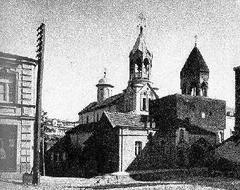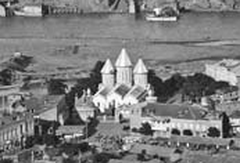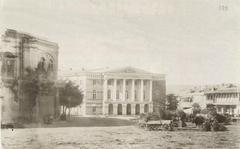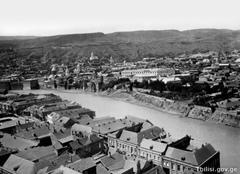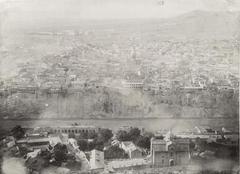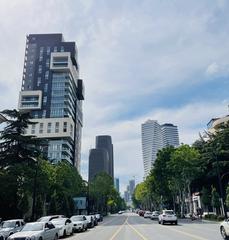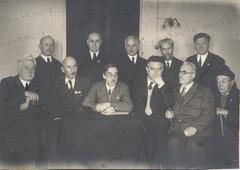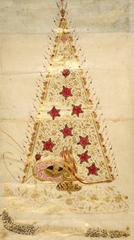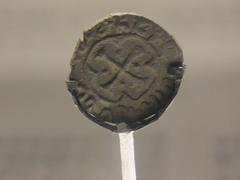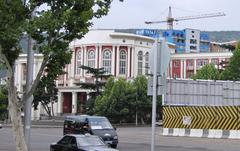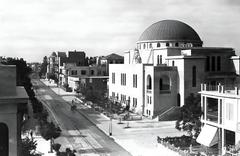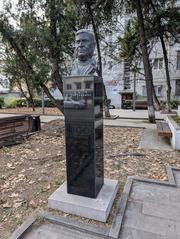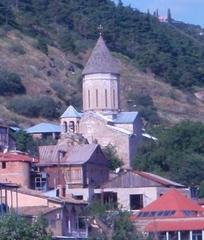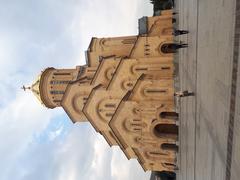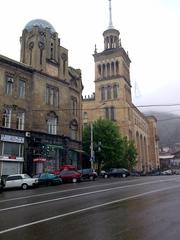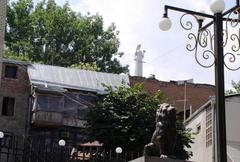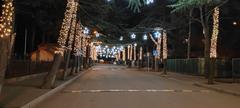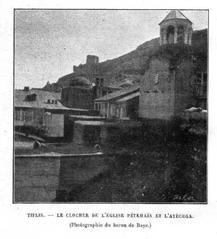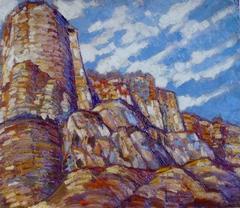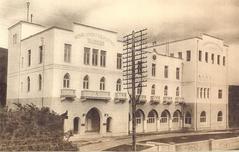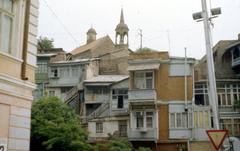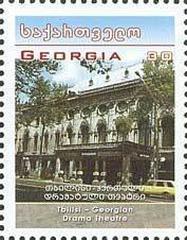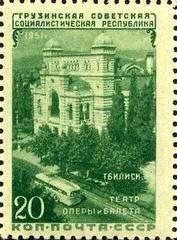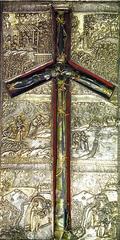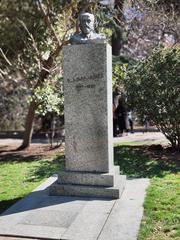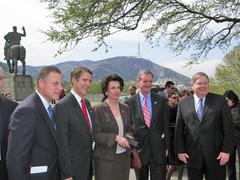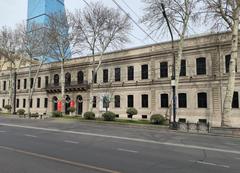Grigol Robakidze University Visiting Hours, Tickets, and Travel Guide — Tbilisi, Georgia
Date: 14/06/2025
Introduction to Grigol Robakidze University
Grigol Robakidze University, located in the bustling center of Tbilisi, Georgia, is a distinguished institution that merges academic excellence with the country’s rich cultural legacy. Established in 1992 and named after the iconic Georgian writer and philosopher Grigol Robakidze, the university is not only a center for higher education but also a vibrant hub for international cooperation and cultural exchange. Visitors are welcomed to experience its modern campus, delve into its historical roots, and participate in a range of events that celebrate both Georgian identity and global dialogue.
The university is open to visitors on weekdays from 9:00 AM to 6:00 PM, with free entry to the campus. Guided tours are available to offer a deeper understanding of the university’s architectural highlights, history, and the active, diverse student life. On-campus events such as international festivals and academic seminars provide additional opportunities for cultural enrichment.
Situated in the heart of Tbilisi, Grigol Robakidze University is also ideally placed for exploring nearby attractions including Old Town, Freedom Square, and the Georgian National Museum. Whether your interest is academic, cultural, or simply exploratory, this comprehensive guide will help you plan a rewarding visit.
For further details, consult the official Grigol Robakidze University website and explore additional resources on Tbilisi Tourism.
Table of Contents
- Introduction
- Historical Overview and Significance
- Visiting Grigol Robakidze University: Practical Information
- Cultural and Social Activities
- Nearby Attractions in Tbilisi
- Visual and Media Resources
- Frequently Asked Questions (FAQ)
- Vibrant Student Life at Grigol Robakidze University
- Campus Atmosphere and Facilities
- Student Organizations and Extracurricular Activities
- Cultural Diversity and Multicultural Environment
- Support Services for International Students
- Safe and Welcoming City Life
- Academic and Research Opportunities
- Alumni Network and Career Development
- Scholarships and Financial Aid
- Practical Tips for Visitors and Prospective Students
- Notable Student Experiences
- Conclusion
Historical Overview and Significance
Founded during a pivotal era in Georgia’s educational evolution, Grigol Robakidze University quickly emerged as a leading academic institution. Named after Grigol Robakidze (1880–1962), whose philosophical and literary works remain influential, the university reflects his legacy in its mission and ethos. Early international collaborations, such as lectures by American and German scholars from 1994 onward, set the stage for a global perspective that continues today. The university’s academic programs, partnerships, and cultural initiatives have made it a cornerstone of Georgian higher education and a bridge to the broader world.
Visiting Grigol Robakidze University: Practical Information
Visiting Hours and Admission
- Hours: Monday–Friday, 9:00 AM – 6:00 PM. Weekend access may be restricted.
- Admission: General campus access is free. Certain specialized facilities or events may require advance booking or tickets.
- Guided Tours: Available upon request. To arrange, contact the International Hub ahead of your visit for schedules and language options.
On-Site Facilities
The campus features modern lecture halls, a well-resourced library, and cultural centers. Visitors may have the opportunity to attend public events such as the International Festival of Publicistic TV Programmes and Documentaries “Centaur,” which are periodically open to the public and offer immersive cultural experiences.
Accessibility
The university is committed to inclusivity, with accessible entrances and facilities for visitors with disabilities. For specific needs, it is best to notify the university in advance to ensure appropriate arrangements.
Cultural and Social Activities
Grigol Robakidze University serves as a dynamic cultural center, hosting regular public lectures, student festivals, and international seminars. The International Hub supports cross-cultural dialogue and encourages participation from both local and international visitors. These events offer a unique window into Georgian traditions as well as global academic exchange.
Nearby Attractions in Tbilisi
Your visit to the university can be enhanced by exploring local landmarks, all within easy reach:
- Old Town (Dzveli Tbilisi): Meandering streets, historic architecture, and vibrant local life.
- Freedom Square: A focal point in Tbilisi, surrounded by notable buildings and shops.
- Georgian National Museum: Exhibiting the nation’s rich archaeological and artistic heritage.
- Mtatsminda Park: A hilltop park with panoramic views of the city.
Pairing a university visit with these sites offers a comprehensive Tbilisi experience.
Visual and Media Resources
For a preview of campus facilities and events, explore the university’s official website, which features galleries, virtual tours, and video content showcasing daily life and special occasions.
Frequently Asked Questions (FAQ)
Q: What are the visiting hours of Grigol Robakidze University?
A: Monday to Friday, 9:00 AM to 6:00 PM. Weekend visits are generally not available.
Q: Is there an entry fee?
A: No, campus entry is free. Some events or tours may require prior booking or a nominal fee.
Q: Are guided tours offered?
A: Yes, arrange through the university’s International Hub.
Q: Are facilities accessible for visitors with disabilities?
A: Yes; contact the university in advance for specific arrangements.
Q: What events can visitors attend?
A: Public lectures, festivals, and seminars are held throughout the year, often open to visitors.
Narikala Fortress Tbilisi: Guide to Visiting an Iconic Historical Site
Introduction
Narikala Fortress, perched on a steep hill above Tbilisi, is one of Georgia’s most treasured historical monuments. Dating from the 4th century, the fortress offers sweeping views over the city and is a must-see for any visitor interested in history or architecture.
History
Originally built as a Persian citadel, Narikala Fortress has undergone numerous renovations and expansions under various rulers, including Byzantine, Arab, Mongol, and Georgian kingdoms. Its strategic location made it vital for defending Tbilisi. Despite damages from earthquakes and sieges, restoration efforts have preserved its role as a symbol of Georgia’s enduring spirit.
Cultural Significance
Beyond its military history, Narikala is a cultural emblem, housing the reconstructed St. Nicholas Church and reflecting the blend of influences that have shaped Georgian identity.
Visiting Information
- Hours: Daily, 9:00 AM – 7:00 PM (summer hours may be extended).
- Admission: Entry to the outdoor grounds is free. Guided tours and access to some restricted areas may require a ticket (approx. 10 GEL).
- Getting There: Accessible by foot from Old Town or via cable car from Rike Park.
- Best Time: Early morning or late afternoon for fewer crowds and optimal lighting.
Highlights
- Panoramic Views: Overlook the Mtkvari River, old city, and skyline.
- St. Nicholas Church: Adds spiritual and historical depth to the fortress.
- Ancient Walls: Authentic medieval atmosphere for exploration and photography.
Accessibility & Facilities
The fortress is on uneven terrain; wear sturdy shoes. Marked paths and rest spots are available, with cafes and public restrooms nearby in Old Town.
Nearby Attractions
- Tbilisi Old Town: Historic streets, markets, and traditional architecture.
- Metekhi Church: Another key historical site close to the fortress.
- Rike Park: The cable car starting point, with modern art and green spaces.
Guided Tours & Events
Guided tours provide historical context and storytelling. Cultural events, reenactments, and art exhibitions are held, especially during city festivals.
Virtual and Interactive Resources
Virtual tours and interactive maps can be accessed via the official Tbilisi tourism website.
FAQ
Q1: Is Narikala Fortress suitable for children?
A: Yes, with supervision due to uneven paths.
Q2: Are there entrance fees?
A: Outdoor access is free; fees apply for tours or special exhibits.
Q3: Can I visit at night?
A: Generally closed after 7:00 PM, but city views nearby are excellent after dark.
Q4: Is photography allowed?
A: Yes, and the site is very photogenic.
Grigol Robakidze Monument in Tbilisi: Visitor Guide
Introduction
The Grigol Robakidze Monument stands in central Tbilisi as a tribute to one of Georgia’s literary greats. This monument not only honors Robakidze’s cultural legacy but adds artistic value to the city’s landscape. It is a meaningful stop for those interested in literature, history, or Georgian national identity.
History
Unveiled in [Year], the monument commemorates Grigol Robakidze (1880–1962), a central figure in Georgian literature and philosophy. Created by renowned sculptors, it symbolizes his enduring influence.
Cultural Importance
Robakidze’s work helped shape modern Georgian literature and fostered national pride. The monument is a focal point during literary and cultural festivals.
Visiting Details
- Hours: Open year-round, 7:00 AM – 9:00 PM.
- Admission: Free. Nearby museums may have separate entry fees.
- Location: [Insert exact address]. Easily accessible by public transport; nearest station is [Station Name]. Limited parking available.
Tips for Visitors
- Wear comfortable shoes for the park setting.
- Combine with visits to Old Town and Narikala Fortress.
- Attend during festivals for special events or guided tours.
Accessibility
The monument is set within a park with paved, accessible paths.
Guided Tours & Events
Included in many city walking tours, the monument is often highlighted during national literary celebrations. For bookings, visit the Official Tbilisi Tourism website.
Photography
- Sunset and early morning provide the best lighting and fewest crowds.
- Creative photo opportunities from benches and paths nearby.
FAQ
Q1: Is there an entrance fee?
A: No, access is free.
Q2: Best times to visit?
A: Early mornings and late afternoons, weekdays preferred.
Q3: Are guided tours available?
A: Yes, often as part of city tours.
Q4: Is the monument accessible?
A: Yes, with paved paths.
Q5: Open year-round?
A: Yes, daily access.
Additional Resources
Vibrant Student Life at Grigol Robakidze University
Campus Atmosphere and Facilities
The university offers a contemporary, student-friendly campus equipped with modern lecture halls, libraries, laboratories, and recreational spaces. High-speed internet and digital resources foster an environment ideal for both study and socializing (studypalacehub.com). Its central Tbilisi location provides easy access to the city’s cultural and entertainment venues (medium.com).
Student Organizations and Extracurricular Activities
A diverse range of student organizations and clubs support academic, cultural, and social interests. Regular events—workshops, debates, festivals—encourage leadership and networking. Sports teams and fitness clubs promote health and camaraderie.
Cultural Diversity
The university’s multicultural environment welcomes students from Georgia and abroad, especially in its MBBS program. English is the primary medium of instruction for many courses, enabling inclusivity (studypalacehub.com). Events like International Student Days and cultural exchanges nurture global awareness.
Support for International Students
International students receive tailored support, from admissions and visa guidance to orientation and language assistance. Counseling, academic advising, and peer mentoring are readily available (studypalacehub.com).
City Life and Safety
Tbilisi is recognized as a safe, affordable city for students, with accessible public transport and welcoming locals. Living costs are lower than in many European cities, and student discounts are widespread (studypalacehub.com).
Academic and Research Opportunities
Faculty are active researchers who involve students in projects and conferences. The university follows the European Credit Transfer System (ECTS), supporting international mobility (medium.com).
Alumni and Career Development
A strong alumni network aids professional growth, while career services support students in job placement, resume writing, and interview preparation (medium.com).
Scholarships and Financial Aid
A range of scholarships and financial aid options are available, including merit-based and need-based awards, with detailed information on the university’s website (medium.com).
Practical Tips
- Accommodation: The university helps students secure housing; apply early.
- Health: Medical facilities and health insurance options are provided.
- Transport: Well-connected by metro, bus, and taxi.
- Cultural Etiquette: Respect local customs and engage with Georgian traditions for a more rewarding experience.
- Networking: Participate in clubs and events for personal and professional connections.
Student Experiences
Students consistently praise the supportive academic environment, diversity, and opportunities for growth. The balance of robust academics, active campus life, and multicultural exposure defines the university experience (studypalacehub.com; medium.com).
Conclusion and Final Tips
Grigol Robakidze University stands as a unique blend of academic tradition, cultural vibrancy, and international engagement in the heart of Tbilisi. Its accessible campus, varied student life, and proximity to key city landmarks make it an ideal destination for visitors and prospective students alike.
Make the most of your visit by joining a guided tour, attending a public event, and exploring Tbilisi’s historic sites. Download the Audiala app for personalized travel guides, interactive maps, and up-to-date information.
For further planning, refer to the official Grigol Robakidze University website and the Tbilisi Tourism portal.
References and Further Reading
- Grigol Robakidze University Official Website
- Tbilisi Tourism
- StudyPalaceHub — Student Life and Multicultural Environment at Grigol Robakidze University
- Comprehensive Guide to Grigol Robakidze University — Medium
- Georgian National Museum
- UNESCO World Heritage Sites in Tbilisi
